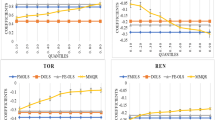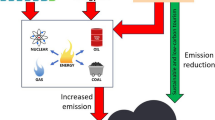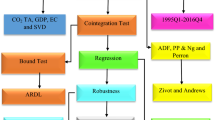Abstract
In recent years, there is concerted efforts to boost the tourism industry in Nigeria, and regulatory bodies were created for the tourism industry. This study is contributing to the ongoing debate on the tourism-energy-environment literature. Thus, we explore the linkage between tourism development, energy consumption, carbon dioxide (CO2) emission, and renewable energy consumption in Nigeria for the period of 1995–2016. The present study leverages on Bounds testing to cointegration in a carbon-income function environment while incorporating renewable energy consumption to the econometric framework. Subsequently, autoregressive distributed lag methodology alongside dynamic ordinary least square (DOLS) is utilized for robustness of estimations. Empirical results give credence to the energy-induced emission hypothesis in Nigeria. This outcome is suggestive to policymakers as fossil fuel-based energy consumption deplete the quality of the environment. Similarly, the study also affirms the environmental Kuznets curve (EKC) phenomenon. The emphasis on Nigerian growth trajectory (real income level) relative to her quality of environment via the channel of economic development and energy consumption from fossil-fuel source is indicated. On the other hand, renewable energy consumption in Nigeria shows significant ability to reduce emission level in Nigeria. This result is insightful, which implies that environmental quality is not threatened with an increase in tourist arrivals, hence tourism does not degrade the environment but is sustainable to the environment. Interesting and laudable for stakeholders’ international tourism arrival did not deplete the quality of the environment. The plausible explanation is attributed to the scale of tourism in Nigeria which at the moment is still low or much more there is caution/awareness on ecotourism for sustainable environment.
Similar content being viewed by others
References
Adedipe A (2018) ‘Star Rating Attributes and Accommodation Performance of Upmarket Hotels in Abuja Territory, Nigeria’ a Thesis submitted in fulfilment of the requirements for the award of the Degree of Doctor of Philosophy in Hospitality in the School of Hospitality and Tourism of Kenyatta University. Kenya available online at https://ir-library.ku.ac.ke/bitstream/handle/123456789/19072/Star%20Rating%20Attributes%20and%20Accommodation.pdf?sequence=1. Accessed 11/02/2020
Adedoyin FF, Nathaniel S, Adeleye N (2021) An investigation into the anthropogenic nexus among consumption of energy, tourism, and economic growth: do economic policy uncertainties matter? Environ Sci Pollut Res 28(3):2835–2847
Adesanya AA, Schelly C (2019) Solar PV-diesel hybrid systems for the Nigerian private sector: An impact assessment. Available at https://www.sciencedirect.com/science/article/abs/pii/S0301421519303428
Adesina KI, Ngozi E (2013) Hospitality business vs. environmental sustainability: a study of Soarak hotel and casino, Lagos. Int J Sci Res 2319–7064
Albalate D, Bel i Queralt G, Calzada J (2010) Urban transport governance reform in Barcelona. IREA– Working Papers, 2010, IR10/09
Alao O, Awodele K (2018) An overview of the nigerian power sector, the challenges of its national grid and off-grid development as a proposed solution. 2018 IEEE PES/IAS PowerAfrica, PowerAfrica 2018, 178–183
Alola AA, Yalçiner K, Alola UV, Saint Akadiri S (2019) The role of renewable energy, immigration and real income in environmental sustainability target. Evidence from Europe largest states. Sci Total Environ 674:307–315
Amalu T, Oko U, Igwe I, Ehugbo U, Okeh B, Duluora E (2021) Tourism industry effects on socio-cultural activities of host communities: evidence from Cross River State. Nigeria Geojournal 86(4):1691–1703
Balaguer J, Cantavella-Jorda M (2002) Tourism as a long-run economic growth factor: the Spanish case. Appl Econ 34(7):877–884
Balsalobre-Lorentes D, Driha OM, Sinha A (2020) The dynamic effects of globalization process in analyzing N-shaped tourism led growth hypothesis. J Hosp Tour Manag 43:42–52
Bekun FV, Agboola MO (2019) Electricity consumption and economic growth nexus: evidence from maki cointegration. Inzinerine Ekonomika-Eng Econ 30(1):14–23
Bekun FV, Emir F, Sarkodie SA (2019) Another look between energy consumption, carbon dioxide emission and economic growth in South Africa. Sci Total Environ 655:759–765
Brau R, Lanza A, Pigliaru F (2003) How fast are the tourism countries growing? The cross-country evidence. The Cross-Country Evidence (September 2003)
Brida JG, Cortes-Jimenez I, Pulina M (2016) Has the tourism-led growth hypothesis been validated? A literature review. Curr Issues Tour 19(5):394–430
Chen Y, Wang Z, Zhong Z (2019) CO2 emissions, economic growth, renewable and non-renewable energy production and foreign trade in China. Renew Energy 131:208–216
Dantata MA (2011) Meeting the challenges of climate change to tourism: Nigeria’s experience. Available at http://www.iipt.org/IIPT%20Book/articles/Munzali%20Dantata.Meeting%20the%20Challenges.pdf
De Vita G, Katircioglu S, Altinay L, Fethi S, Mercan M (2015) Revisiting the environmental Kuznets curve hypothesis in a tourism development context. Environ Sci Pollut Res 22(21):16652–16663
Ekundayo Y (2014) Strategic development and sustainability of Tourism Industry in Nigeria. available at https://urn.fi/URN:NBN:fi:amk-2014112917496
Engle RF, Granger CW (1987) Co-integration and error correction: representation, estimation, and testing. Econometrica: Journal of the Econometric Society 251–276
Ghali MA (1976) Tourism and economic growth: an empirical study. Economic Development and Cultural Change 24(3):527–538
Gyamfi BA, Bein MA, Bekun FV (2020) Investigating the nexus between hydroelectricity energy, renewable energy, nonrenewable energy consumption on output: evidence from E7 countries. Environ Sci Pollut Res 27:25327–25339
Heidari H, Katircioglu ST, Saeidpour L (2015) Economic growth, CO2 emissions, and energy consumption in the five ASEAN countries. Int J Electr Power Energy Syst 64:785–791. https://doi.org/10.1016/j.ijepes.2014.07.081
Johansen S (1988) Statistical analysis of cointegration vectors. J Econ Dyn Control 12(2–3):231–254
Karim J (2021) Nigerian Tourism; 3 Tough challenges and 5 solutions https://www.academia.edu/35492351/NIGERIA_TOURISM_3_TOUGH_CHALLENGES_and_5_SOLUTIONS
Katircioğlu ST (2014) Testing the tourism-induced EKC hypothesis: the case of Singapore. Econ Model 41:383–391
Katircioglu ST, Taspinar N (2017) Testing the moderating role of financial development in an environmental Kuznets curve: empirical evidence from Turkey. Renew Sustain Energy 68:572–586. https://doi.org/10.1016/j.rser.2016.09.12
Khan I, Hou F (2021) The dynamic links among energy consumption, tourism growth, and the ecological footprint: the role of environmental quality in 38 IEA countries. Environ Sci Pollut Res 28(5):5049–5062
Kurniawan R, Managi S (2018) Coal consumption, urbanization, and trade openness linkage in Indonesia. Energy Policy 121:576–583. https://doi.org/10.1016/j.enpol.2018.07.023
Lee H, Lee J, Chung N, Koo C (2018) Tourists’ happiness: are there smart tourism technology effects? Asia Pac J Tour Res 23(5):486–501
Lin B, Omoju OE, Okonkwo JU (2016) Factors influencing renewable electricity consumption in China. Renew Sustain Energy Rev 55:687–696
Liu Y, Kumail T, Ali W, Sadiq F (2019) The dynamic relationship between CO2 emission, international tourism and energy consumption in Pakistan: a cointegration approach. Tourism Review
Matthew OA, Ede C, Osabohien R, Ejemeyovwi J, Ayanda T, Okunbor J (2021) Interaction effect of tourism and foreign exchange earnings on economic growth in Nigeria. Glob Bus Rev 22(1):7–22
Muazu L, Basri R, Noor AZ (2017) Predictors of likelihood of adoption of green practices in hotels: the case of Abuja and Lagos, Nigeria. Environ Manag Sustain Dev 6(1):72–90
Narayan PK (2005) The saving and investment nexus for China: evidence from cointegration tests. Appl Econ 37(17):1979–1990. https://doi.org/10.1080/00036840500278103
Nathaniel OO, Olaife AV (2021) Tourism, globalization and economic growth in Nigeria. Afr J Econ Rev 9(2):257–270
Nelson CR, Plosser CR (1982) Trends and random walks in macroeconomic time series: some evidence and implications. J Monet Econ 10(2):139–162
Nissan E, Galindo MA, Méndez MT (2011) Relationship between tourism and economic growth. Serv Ind J 31(10):1567–1572
Oluseyi PO, Babatunde OM, Babatunde OA (2016) Assessment of energy consumption and carbon footprint from the hotel sector within Lagos, Nigeria. Energy Build 118:106–113
Ozturk I (2016) The relationships among tourism development, energy demand, and growth factors in developed and developing countries. Int J Sust Dev World 23(2):122–131
Ozturk I, Acaravci A (2009) On the causality between tourism growth and economic growth: Empirical evidence from Turkey. Transylvanian Rev Adm Sci 5(25):73–81
Ozturk I, Al-Mulali U, Saboori B (2016) Investigating the environmental Kuznets curve hypothesis: the role of tourism and ecological footprint. Environ Sci Pollut Res 23(2):1916–1928
Pesaran MH, Shin Y, Smith RP (1999) Pooled mean group estimation of dynamic heterogeneous panels. J Am Stat Assoc 94(446):621–634
Pesaran MH, Shin Y, Smith RJ (2001) Bounds testing approaches to the analysis of level relationships. J Appl Econ 16(3):289–326. https://doi.org/10.1002/jae.616
Qi T, Zhang X, Karplus VJ (2014) The energy and CO2 emissions impact of renewable energy development in China. Energy Policy 68:60–69
Rahman ZU, Chongbo W, Ahmad M (2019) An (a) symmetric analysis of the pollution haven hypothesis in the context of Pakistan: a nonlinear approach. Carbon Manag 10(3):227–239. https://doi.org/10.1080/17583004.2019.1577179
Raza SA, Qureshi MA, Ahmed M, Qaiser S, Ali R, Ahmed F (2021) Non-linear relationship between tourism, economic growth, urbanization, and environmental degradation: evidence from smooth transition models. Environ Sci Pollut Res 28(2):1426–1442
Roy P, Iwuamadi KC, Ibrahim J (2020) Breaking the cycle of corruption in Nigeria’s electricity sector: a political settlements analysis. ACE SOAS Consortium 020:1–19
Saikkonen P (1992) Estimation and testing of cointegrated systems by an autoregressive approximation. Economet Theor 8:1–27
Saint Akadiri S, Alola AA, Akadiri AC (2019) The role of globalization, real income, tourism in environmental sustainability target. Evidence from Turkey. Sci Total Environ 687:423–432
Salehi M, Filimonau V, Ghaderi Z, Hamzehzadeh J (2021) Energy conservation in large-sized hotels: Insights from a developing country. Int J Hosp Manag 99:103061
Sarpong SY, Bein MA, Gyamfi BA, Sarkodie SA (2020) The impact of tourism arrivals, tourism receipts and renewable energy consumption on quality of life: a panel study of Southern African region. Heliyon 6(11):e05351
Shan J, Wilson K (2001) Causality between trade and tourism: empirical evidence from China. Appl Econ Lett 8(4):279–283
Sharif A, Saha S, Campbell N, Sinha A, Ibrahiem DM (2020) Tourism, environment and energy: an analysis for China. Curren Issues Tour 23(23):2930–2949
Shehu AI, Inuwa II, Husseini IU, Yakubu I (2019) Hotel energy application practices in Abuja Nigeria. J Sustain Dev 12(6):27–38
Solarin SA, Al-Mulali U, Musah I, Ozturk I (2017) Investigating the pollution haven hypothesis in Ghana: an empirical investigation. Energy 124:706–719. https://doi.org/10.1016/j.energy.2017.02.089
Stock J, Watson M (1993) A simple estimator of cointegrating vectors in higher order integrated system. Econometrica 61(4):783–820. https://doi.org/10.2307/2951763
United Nations World Tourism Organization (UNWTO) 2020 available at International Tourist Numbers Could Fall 60-80% in 2020, UNWTO Reports | UNWTO. Access date 16.02.2021
Usman M, Yaseen MR, Kousar R, Makhdum MSA (2021) Modeling financial development, tourism, energy consumption, and environmental quality: is there any discrepancy between developing and developed countries? Environ Sci Pollut Res 1–22
Wang L, Tao Z (2013) Dynamic relationship among consumption of renewable energy, economic growth and carbon emission in China. Technol Econ 32(11):99–104
Weaver D (2011) Can sustainable tourism survive climate change? J Sustain Tour 19(1):5–15
World Bank (2020) World Development Indicators. Washington, USA
WTTC (2014, 2015) World Travel and Tourism Council, 2014 & 2015. The Authority on World Travel and Tourism: Travel and Tourism Economic Impact on Nigeria
World Travel and Tourism Council (2019) The authority on world travel and tourism: travel and tourism economic impact on Nigeria. https://wttc.org/. Accessed 11.02.2020
Yetano Roche M, Verolme H, Agbaegbu C, Binnington T, Fischedick M, Oladipo EO (2020) Achieving Sustainable Development Goals in Nigeria’s power sector: assessment of transition pathways. Clim Policy 20(7):846–865
Yusuf MA (2016) ‘Performance assessment of tourism sector as a vital tool of economic growth in Nigeria. Int J Acad Res Bus Soc Sci 6(10):143–150
Zuo B, Huang S (2018) Revisiting the tourism-led economic growth hypothesis: the case of China. J Travel Res 57(2):151–163
Author information
Authors and Affiliations
Contributions
Ruth Bamidele: contributed to idea conceptualization of the study. Ilhan Ozturk: supervising and manuscript editing. Bright Akwasi Gyamfi: design, analysis, and conclusion. Festus Victor Bekun: literature search.
Corresponding author
Ethics declarations
Ethical approval
Not applicable.
Consent to participate
Not applicable.
Consent to publish
The authors have provided consent to publish this work is accepted.
Competing interests
The authors have declared no competing interests.
Additional information
Responsible Editor: Philippe Garrigues
Publisher's note
Springer Nature remains neutral with regard to jurisdictional claims in published maps and institutional affiliations.
Rights and permissions
About this article
Cite this article
Bamidele, R., Ozturk, I., Gyamfi, B.A. et al. Tourism-induced pollution emission amidst energy mix: evidence from Nigeria. Environ Sci Pollut Res 29, 19752–19761 (2022). https://doi.org/10.1007/s11356-021-17233-8
Received:
Accepted:
Published:
Issue Date:
DOI: https://doi.org/10.1007/s11356-021-17233-8




